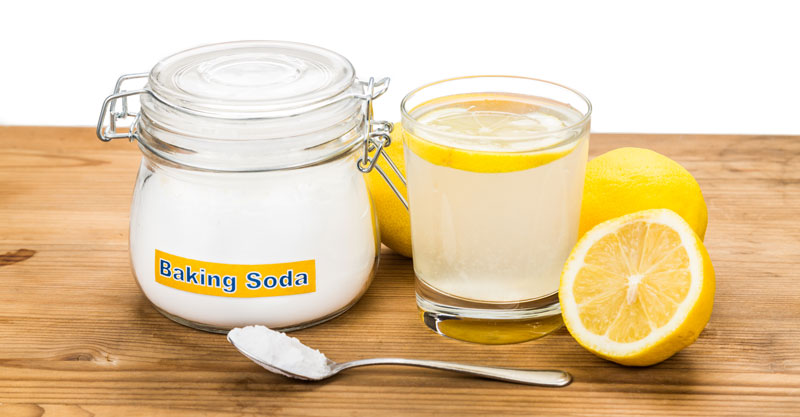Stomach upset and indigestion is a very common after eating or drinking. In most cases it’s not something to worry about and it is easily to treat the symptoms using some home remedies.
Common symptoms of an upset stomach and indigestion include:
- Heartburn, or acid reflux
- Nausea
- Gas / Farting
- Bloating
- Belching, sometimes bringing up bitter or foul-tasting fluid or food
- Bad-smelling or sour breath
- Hiccupping or coughing
In this article IntoPosts brings 19 most popular home remedies to relief a stomach ache and indigestion. It is also explained when to see a doctor.
Twenty Home Remedies
Some of the most popular home remedies for an upset stomach and indigestion include:
1. Avoid to lie down after eating
Right after eating, the body needs to be vertical so the food goes easily to the stomach. On the contrary, if you lie down, the body will be horizontal and the acid in the stomach can travel backward and move upward, causing heartburn most probably.
Those with an upset stomach should avoid lying down or going to bed for at least a few hours after eating. If you are those who need to lie down, then you should prop up their head, neck, and upper chest with pillows, ideally at a 30-degree angle.
2. Drink water
 Dehydration can increase the likelihood of an upset stomach.
Dehydration can increase the likelihood of an upset stomach.
The body needs water to digest and absorb nutrients from foods and drinks efficiently. If we are not sufficiently hydrated we may provoke digestion difficulties as well as less effective, increasing mostly an upset stomach.
In general, the Health and Medicine Division (HMD) recommend that:
– Women should have around 2.7 litres (l), or 91 ounces (oz), of water a day
– Men should have about 3.7 litres, or 125 oz, of water a day
Fluids can be found with what we eat, being around 20% percent, the rest of water needed should come from beverages. The majority of adults will need 8 or more cups of water a day. On the contrary, for those young children less water is needed require slightly less water than adults.
Some people should drink water before meals as liquids add volume to the stomach, increasing the stomach pressure and leading to acid reflux.
3. Avoid foods hard to digest
There are foods harder to digest than others, increasing the risk of an upset stomach. If you are those Anyone with an upset stomach or an irritable bowel syndrome (IBS), should avoid these foods:
– Insoluble fibre
– Fatty or fried foods
– Dairy – Milk and cheese
– Gluten
– Beans and legumes
– Caffeinated drinks
– Processed foods
– Sugar-free sweeteners
– Chocolate
– Alcohol
– Garlic and onions
– Broccoli and cauliflower
Look into a wider explanation at Healthline
[show_more more=”Read more, till the end” less=”Less”]
4. Avoid alcohol and smoking
 Those who smoke can irritate their throat and increase the probability of a stomach ache.
Those who smoke can irritate their throat and increase the probability of a stomach ache.
Alcohol is a toxin being difficult to digest and can cause serious damage to the liver and stomach lining.
It is highly recommended to people with an upset stomach that they should avoid smoking and drinking alcohol.
5. Taking a warm bath or using a heating bag
As heat may relax tense muscles and therefore ease indigestion, we recommend taking a warm bath to ease the symptoms of a stomach ache.
An alternative is to apply a heated bag or pad to the stomach for 20 minutes maximum to avoid burning the skin
6. The BRAT diet
Many doctors recommend the BRAT diet to those people suffering diarrhea.
 BRAT stands for Bananas, Rice, Applesauce, and Toast. These foods are reach in starch; therefore, they help bind foods together to make stools firmer decreasing the number of times going to WC and helping with the diarrhea.
BRAT stands for Bananas, Rice, Applesauce, and Toast. These foods are reach in starch; therefore, they help bind foods together to make stools firmer decreasing the number of times going to WC and helping with the diarrhea.
Most of the foods in the BRAT diet are also high in nutrients such as potassium and magnesium and can replace those lost through diarrhea.
7. Cinnamon
 Substances in cinnamon may help to reduce gas and bloating.
Substances in cinnamon may help to reduce gas and bloating.
It is quiet known that Cinnamon contains several antioxidants that helps on digestion. It also reduces irritation risk that could damage the digestive tract. Just to mention a few of the antioxidants in cinnamon:
– Eugenol
– Cinnamaldehyde
– Linalool
– Camphor
Cinnamon has other substances that may help to reduce gas, bloating, cramping, and belching. As well to neutralize stomach acidity to reducing heartburn and indigestion.
Those people with an upset stomach should try adding 1 tablespoon of cinnamon powder, or a piece of cinnamon stick into their meals. Another application is mixing the cinnamon with any tea. Indigestion may be removed after doing this two or three times daily.
8. Ginger
Ginger is a natural anti-inflammatory component and an excellent therapy for an upset stomach and indigestion.
Ginger contains chemicals called gingerols and shogaols that can help speed up stomach contractions and help with a faster digestion.
The anti-inflammatory substances in ginger may also help to reduce nausea, vomiting, and diarrhea.
People with an upset stomach should try adding ginger to their meals or tea.
9. Lime or lemon juice, baking soda, and water
Some studies recommend for any type of digestive grievances mixing lemon juice in warm water with a pinch of baking.
This mixture produces carbonic acid, which reduces any type of indigestion and gas. The acidity and other nutrients in lime or lemon juice can help to digest and absorb fats and alcohol while neutralizing bile acids and reducing acidity in the stomach.
10. Mint
People may use mint to get a fresh breath, but the menthol in mint may be more useful and here is the list:
– Prevents vomiting and diarrhea
– Reduces muscle spasms in the intestines
– Relies pain
This research proves that mint is a good treatment for indigestion, gas, and diarrhea. Mint leaves may be eaten either raw and cooked.
Usually, mint leaves are boiled with cardamom to make a tea. It is also likely to mix mint leaves with other teas, beverages, or foods.
11. Cloves
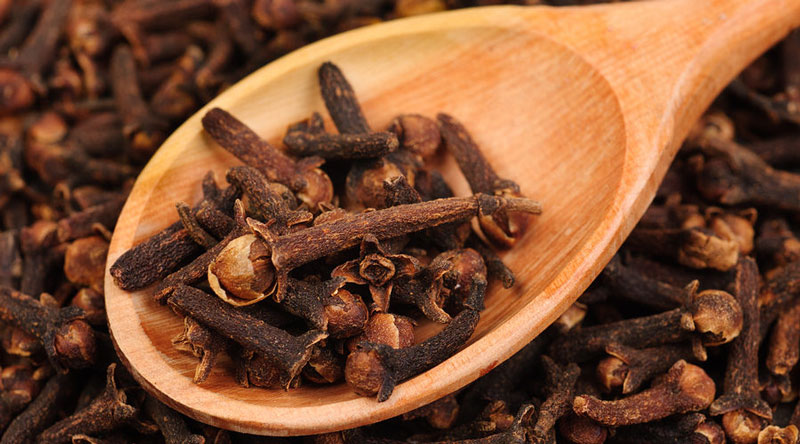 Cloves contain components that help reducing stomach gases and also increase gastric secretions. These substances can make faster a slow digestion, which may reduce pressure and cramping. Cloves may also improve nausea and vomiting.
Cloves contain components that help reducing stomach gases and also increase gastric secretions. These substances can make faster a slow digestion, which may reduce pressure and cramping. Cloves may also improve nausea and vomiting.
Anyone with a stomach ache could try mixing 1 or 2 tablespoons of ground cloves with 1 tablespoon of honey once a day before bedtime. In case of nausea and heartburn, a good alternative is to mix the cloves with 8 oz (225 grs) of boiling water instead to make a clove tea, drinking this combination slowly once or twice daily.
12. Cumin
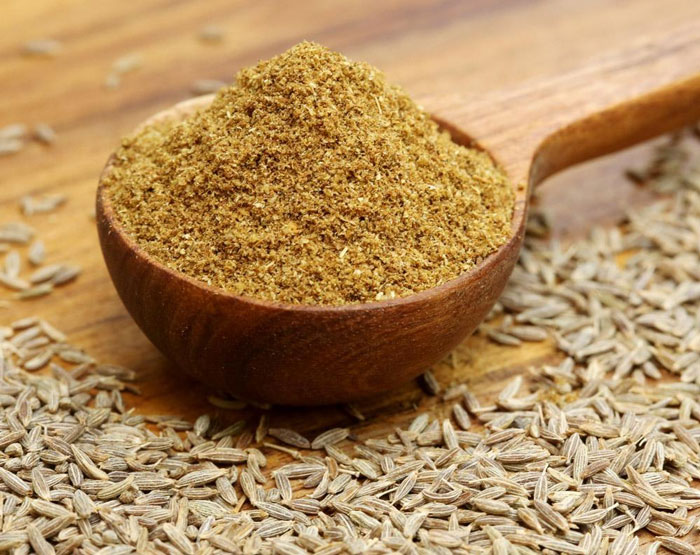 Cumin seeds contain active ingredients that may help by:
Cumin seeds contain active ingredients that may help by:
– Decreasing indigestion and excess stomach acids
– Reducing gas
– Decreasing intestinal inflammation
– Acting as an antimicrobial
Any person with a stomach ache may try mixing 1 or 2 tablespoons of ground cumin with their meals. Another alternative is to add some teaspoons of cumin seeds or powder to boiling water and make a tea out of it.
13. Figs
Figs contain components that can act as laxatives and improve constipation as well to ease indigestion.
Anyone with a stomach ache could try eating a fig several times a day until symptoms improve. Another option is to try brewing 1 or 2 tablespoons of fig leaves to make a tea.
Note, that a Person experiencing diarrhea should avoid eating figs.
14. Aloe juice
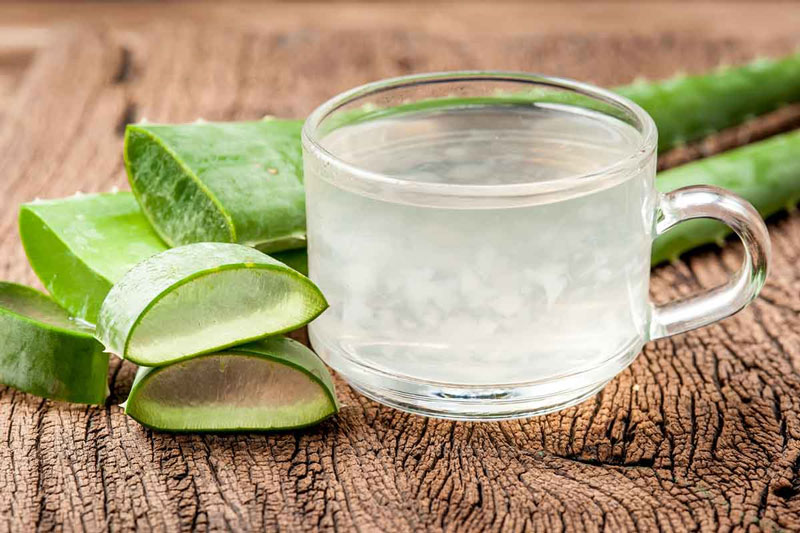 The elements in the aloe juice can be a good source of relief:
The elements in the aloe juice can be a good source of relief:
– Decreasing the excess of stomach acid
– Encouraging healthy bowel movements and toxin removal
– Improving protein digestion and balancing the digestive bacteria
– Acting as anti-inflammatory
A study found that people who had 10 ml of aloe juice daily for 4 weeks found relief from the following symptoms of gastrointestinal reflux disease (GERD):
– Heartburn
– Flatulence and belching
– Nausea and vomiting
– Acid and food regurgitation
15. Basil
 Basil contains substances that may improve digestion, reduce gas, relieve stomach cramping and amazingly increase appetite. Basil contains as well eugenol that may help to reduce stomach acidity symptoms. Also contains a great level of linoleic acid acting as an anti-inflammatory.
Basil contains substances that may improve digestion, reduce gas, relieve stomach cramping and amazingly increase appetite. Basil contains as well eugenol that may help to reduce stomach acidity symptoms. Also contains a great level of linoleic acid acting as an anti-inflammatory.
Any person with a stomach ache could try adding 1 or 2 tablespoons of dried basil seasoning or even a few of fresh basil leaves to meals to try to reduce their symptoms. In case the person has a strong ache and needs immediate results, an alternative is to mix half a teaspoon of dried basil or some fresh leaves with boiled water making a tea to drink slowly.
16. Liquorice
Liquorice root contains components that may help reducing gastritis, or inflammation of the stomach lining, as well as inflammation relating to peptic ulcers.
A person with a stomach ache could try drinking liquorice root tea a few times a day until he feels any improvement on symptoms just mixing 1 or 2 tablespoons of liquorice root powder with boiling water.
17. Spearmint
As well as mint, the spearmint has the similar healing remedies for many digestive grievances, including:
– Nausea
– Stomach and intestinal spasms
– Gastrointestinal infections
– Diarrhea
This ingredient is one of the easiest to consume as it’s highly available. The person could drink any herbal tea in which spearmint is the primary ingredient.
There is no harm in drinking spearmint teas several times daily until symptom improves.
18. Rice
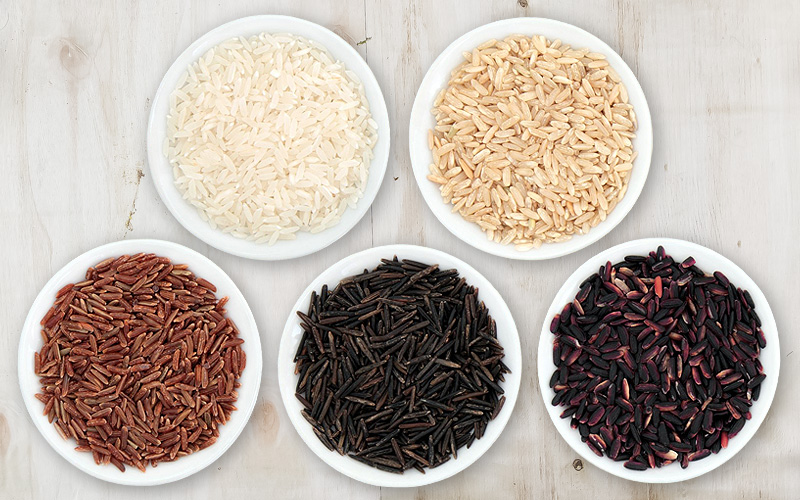 Many different types of rice have been used to appease people’s different types of stomach aches, helping:
Many different types of rice have been used to appease people’s different types of stomach aches, helping:
– A better a more solid defecation
– Absorbing fluids that may contain toxins
– Easing pain and cramps, due to of its high levels of magnesium and potassium
A person with vomit or diarrhea could try very slowly drinking boiled rice water and if he tolerates then eating half a cup of plain, well-cooked rice. Nonetheless it is best to wait a few hours after the last vomiting. The person may continue this treatment for 24–48 hours until diarrhea stops.
Remember rice is also part of the BRAT diet that doctors recommend.
19. Bananas
Bananas contain substances as vitamin B6, potassium, and folate. These nutrients can reduce stomach cramps, aches and even muscle spasms.
As rice, bananas are part of BRAT diet and help by adding bulk to loose stools, which can alleviate diarrhea.
When to see a doctor
 A sporadic stomach ache or indigestion should not be something to be concerned about. Following any of the above listed remedies, most people’s symptoms should be relived within a few hours.
A sporadic stomach ache or indigestion should not be something to be concerned about. Following any of the above listed remedies, most people’s symptoms should be relived within a few hours.
In case the person can become dehydrated, they should seek medical treatment in case vomiting and diarrhea lasts for more than a day.
People with severe, frequent, or persistent stomach problems should consult a doctor as soon as possible. We recommend to seek medical attention in any of these symptoms are present:
– Frequent or uncontrollable vomiting or diarrhea
– Chronic constipation
– Fever
– Bloody stool or vomit
– Inability to pass gas
– Dizziness or light-headedness
– Arm pain
– Unintentional weight loss
– A lump in the abdomen or stomach
– Difficulty swallowing
– History of iron-deficiency anemia or associated conditions
– Pain when urinating
Our article has been inspired by Medical News Today
[/show_more]


